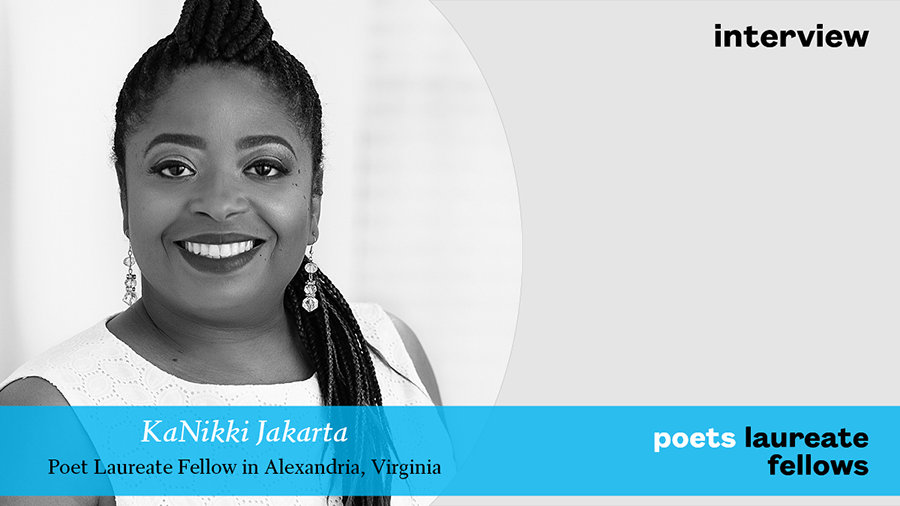
KaNikki Jakarta is the author of three novels, two poetry collections, and a memoir, including Alabama Girl, Virginia Woman (Great Publishing Company, LLC, 2021). She is the inaugural poet in residence for Northern Virginia Fine Arts Association. Jakarta hosts #KaNikkiHarmony and facilitates several workshops in Alexandria, Virginia. She is the co-founder of Keep the Mic On and the first African American poet laureate of Alexandria, Virginia. In 2022, Jakarta was named an Academy of American Poets Laureate Fellow. She will launch “How to Poet,” an eight-week workshop/seminar offered virtually and in person. Spoken word poets will utilize their experiences to create a curriculum with step-by-step information. “How To Poet” will also offer performance mentorships to young poets ages sixteen to twenty-one.
Poets.org: What do you hope for the future of poetry in Alexandria, and what support do you hope future poets laureate in Virginia have?
KaNikki Jakarta: As the first Black poet laureate of Alexandria, Virginia, I set forth on a mission to advance the goal of achieving equity, inclusion, and access for the arts and cultural and creative endeavors by increasing the visibility of poetry, both written and spoken word, within the city through a series of workshops and events. I hope that, in the future, poets and poetry lovers will look to the city as a place that welcomes the arts. I hope that the poets laureate in the future will have a wider platform in support of their missions. I hope that there will be funding to support their initiatives.
Poets.org: How has being a poet laureate changed your relationship to your own writing?
KJ: My father would be so proud; he had an interest in history that did not interest me. As poet laureate, I was commissioned to write original poems for many historical events that required much research. My relationship with writing has been changed in a way that has enlightened me. I have been well educated on the events in my city, and I sought to educate my readers and listeners on what I discovered. I was charged with writing the truth from my eyes. It has been a privilege.
Poets.org: How can a poet, or poetry, bring a community together?
KJ: A poet can bring the community together by writing poems about the unity of the community. Poetry is a powerful tool that welcomes people with similar experiences, letting them know they aren’t alone. Poetry gives permission to voice many opinions. Its rhyme and rhythm is a great tool of inspiration.
Poets.org: Which part of the “How to Poet” curriculum were you most excited about?
KJ: All of it! I was excited to offer the curriculum online because it connects poets from different walks of life. I was thrilled to offer some of the workshops in person after COVID. The most important piece to me was the business of poetry, how to make poetry your business and file it correctly on your taxes. Introducing the business of poetry is of the utmost importance because, when done correctly, it can be of great benefit to those who choose a career in the arts.
Poets.org: What obstacles, if any, did you experience when starting your project?
KJ: Persuading poets to pause on their poetry and focus on the business aspect proved to be a little challenging. But I figured, whether one or one hundred, if this project can help any poet, it has been a success.
Poets.org: Has your work with “Keep the Mic On,” the organization and conversation series which you cofounded, inspired “How to Poet” in any way? How so?
KJ: Keep The Mic On is about getting to the writer behind the mic or the pen. My segment “Poets and Platforms” was the perfect inspiration for “How To Poet” because I spoke with poets who provide platforms for the art of poetry. I was able to pick their brains on the business of providing a platform, such as how to book a venue and how to profit properly.
Poets.org: Is there a poem on Poets.org that inspires you and your work in Alexandria? How so?
KJ: The sonnet “How Do I Love Thee” by Elizabeth Barrett Browning is especially inspirational because you may often hear people say these words, but they may not have any idea that it is a sonnet or know what a sonnet is. I know, for years, I’d heard the first lines quoted, but I had no idea where it originated. The love that she expresses is synonymous with my love for poetry: “With my childhood’s faith [...] I love thee with the breath, / Smiles, tears of all my life; and, if God choose, / I shall but love thee better after death.” We all know that many artists are more famous after death. I just hope that, if I am an inspiration to someone, I live long enough to be told and it is my hope that my words live on, just like Elizabeth’s.
